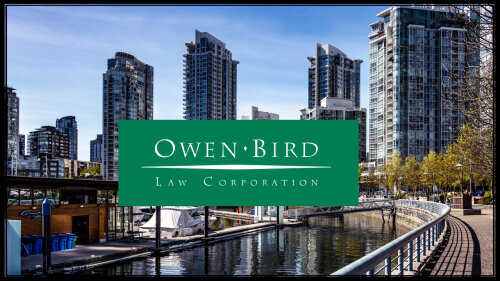Best Hiring & Firing Lawyers in Vancouver
Share your needs with us, get contacted by law firms.
Free. Takes 2 min.
List of the best lawyers in Vancouver, Canada
About Hiring & Firing Law in Vancouver, Canada:
The laws relating to hiring and firing in Vancouver, Canada are designed to protect the rights and interests of both employees and employers. These laws fall under federal as well as provincial jurisdiction - British Columbia in this case. For hiring, they cover aspects like discrimination, human rights, and job advertising. When it comes to termination or firing, these laws encompass issues like wrongful dismissal, notice periods, and severance pay.
Why You May Need a Lawyer:
You may need a lawyer to navigate through various legal complexities associated with hiring and firing in Vancouver. Situations like wrongful termination claims, potential discrimination during the hiring process, or negotiating severance packages are instances where legal advice can be invaluable. It's also important to consult a lawyer when drafting or revising employee contracts to ensure compliance with the latest BC Employment Standards.
Local Laws Overview:
Local laws in Vancouver are governed by both provincial legislation (the BC Employment Standards Act) and federal laws. They provide specific rules concerning job postings, hiring practices, work hours, wages, breaks, vacation entitlements, parental leave, notice for termination, and more. It is illegal for employers to discriminate based on sex, race, religion, age, marital status, physical or mental disability, or sexual orientation during hiring. Also, notice or pay in lieu during termination varies based on length of employment, and wrongful dismissal carries significant penalties.
Frequently Asked Questions:
1. What is considered wrongful dismissal in Vancouver?
Under BC Employment Standards, wrongful dismissal occurs when an employer terminates an employee without just cause and without providing adequate notice or compensation.
2. Can an employer discriminate during the hiring process?
No, employers cannot discriminate based on protected grounds including race, sex, age, religion, marital status, mental or physical disability, and sexual orientation.
3. What are the legal requirements during termination?
The legal requirements during termination include giving proper written notice, paying all outstanding wages, and in some cases, providing severance pay.
4. How is severance pay calculated?
Severance pay in BC is generally calculated based on an individual's length of service and type of employment, but may vary based on individual contracts and circumstances.
5. Are there legal limits to the length and conditions of probationary periods?
Yes, under BC law, probationary periods cannot exceed three months, and during this time, employers may dismiss an employee without notice only for just cause.
Additional Resources:
Places where you can find more information or get help include the BC Employment Standards Branch, the BC Human Rights Tribunal, local legal aid services, and various legal guides available both online and in libraries or law offices.
Next Steps:
If you need legal assistance with hiring or firing in Vancouver, it's recommended to consult with a lawyer who specializes in labour and employment law. Ensure to gather all relevant information and documents, and be ready to discuss your situation in detail for the most effective legal advice.
Lawzana helps you find the best lawyers and law firms in Vancouver through a curated and pre-screened list of qualified legal professionals. Our platform offers rankings and detailed profiles of attorneys and law firms, allowing you to compare based on practice areas, including Hiring & Firing, experience, and client feedback.
Each profile includes a description of the firm's areas of practice, client reviews, team members and partners, year of establishment, spoken languages, office locations, contact information, social media presence, and any published articles or resources. Most firms on our platform speak English and are experienced in both local and international legal matters.
Get a quote from top-rated law firms in Vancouver, Canada — quickly, securely, and without unnecessary hassle.
Disclaimer:
The information provided on this page is for general informational purposes only and does not constitute legal advice. While we strive to ensure the accuracy and relevance of the content, legal information may change over time, and interpretations of the law can vary. You should always consult with a qualified legal professional for advice specific to your situation.
We disclaim all liability for actions taken or not taken based on the content of this page. If you believe any information is incorrect or outdated, please contact us, and we will review and update it where appropriate.












